‘Bol ke lab azaad hain tere’ is no longer true or fashionable in Naya Pakistan. The recent Faiz Festival demonstrated this reality to all of us, both inside and outside of Pakistan. This Fest too appears to have gone the way of the Lahore Lit Fest and other such ‘Festivals’ whose primary purpose appears to be to give the elite of Lahore an opportunity to demonstrate to the world that all is well in Pakistan and liberal-progressive ideas are thriving, even though the reality is the exact opposite.
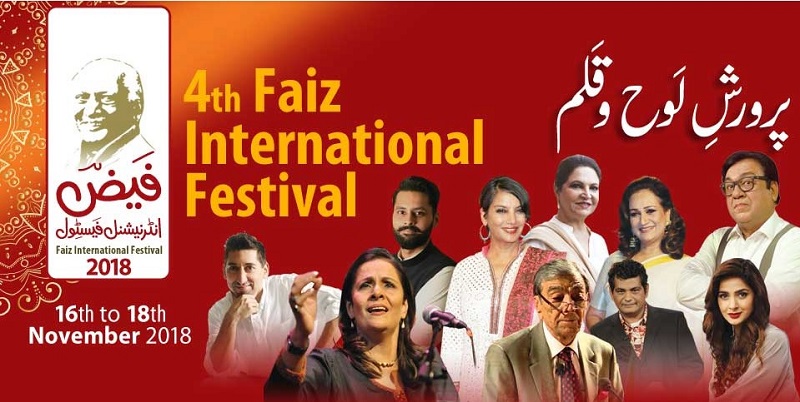
The recently concluded 4th Faiz Festival has come under a lot of flak by leading Pakistani intellectuals and artists.
Fayaz ul Hasan Chohan, the firebrand PTI leader and Culture and Information minister for the state of Punjab, was the chief guest at the Faiz Festival. Chohan visited Mumtaz Qadri’s shrine, the same Qadri who killed Faiz’s wife’s nephew and the son of his friend, Dr. M.D. Taseer –Salmaan Taseer, former Governor of Punjab.
While Chohan could speak at the festival, Pashtun Tahafuz Movement (PTM) leader and Member National Assembly (MNA) Ali Wazir, along with academics Dr Ammar Ali Jaan and Dr Taimur Rahman as well as former editor of Daily Times Rashed Rahman were barred from speaking at the Faiz International Festival. Apparently, ‘someone’ told the organizers that they could hold the festival as long as these speakers, whose names were in the program, did not speak.
Clearly, organizers of the Faiz festival including his family members think it is better to yield to the powers-that-be to commercialize Faiz’s name and poetry. That is a travesty in the name of the poet of resistance who faced imprisonment several times and, in 1965 and 1971, refused to oblige Pakistan’s deep state with poetry extolling the virtues of the country’s soldiers because he disagreed with the wars they were waging.
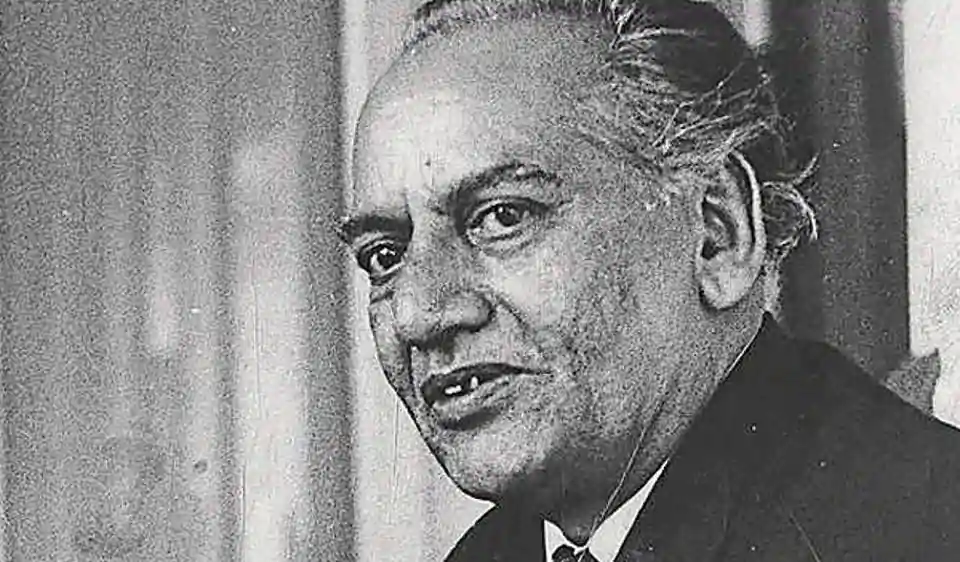
In a Facebook post Dr Taimur Rahman referenced the censorship undertaken during Zia’s era:
““Back in the Zia period, editors published newspapers with black marks of censor on the print copy. This was their method of complying with state censorship while also protesting against these violations of democratic freedoms. In the same way, some chairs were left empty during the Faiz International Festival. These chairs marked the absence of Ali Wazir, Rashed Rahman (my father), Dr Ammar Ali Jan and myself. The four of us were prohibited from speaking at the festival. With great difficulty, I was allowed to perform but not allowed to speak.”
It is clear that the younger members of families of resistance poets of yesteryear does not want to struggle, while enjoying the limelight and commercial benefits of their forbearers’ name and effort. They have sought the easy way out, joined the pretense liberal elite that holds festivals, and events but is unwilling to push back on the ugly reality of Pakistan’s military-intelligence state.
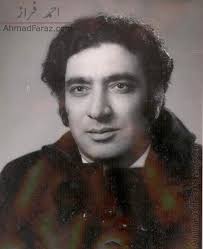
Faiz’s children and family are content running a well-funded Faiz Foundation that sponsors made-for-TV festivals; The son of Ahmed Faraz –the poet dubbed ‘traitor’ by the Pakistan establishment — is a PTI Senator. Shibli Faraz doesn’t even flinch when PTI trolls frequently cite a couplet about seeking praise abroad while criticizing the motherland. The couplet was originally directed at Ahmed Faraz who spent most of the Zia era in exile!
Amongst those who pushed back against what happened at the Faiz festival –at least on Twitter — were Reema Omer, International Legal Adviser for South Asia for ICJ, Human Rights activist Marvi Sirmed, activist and sociologist Nida Kirmani and one of Pakistan’s most well-known writers, Mohammad Hanif.
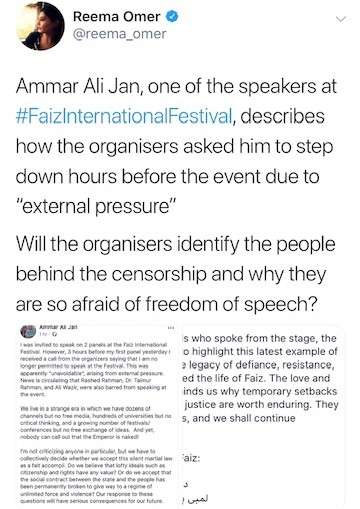
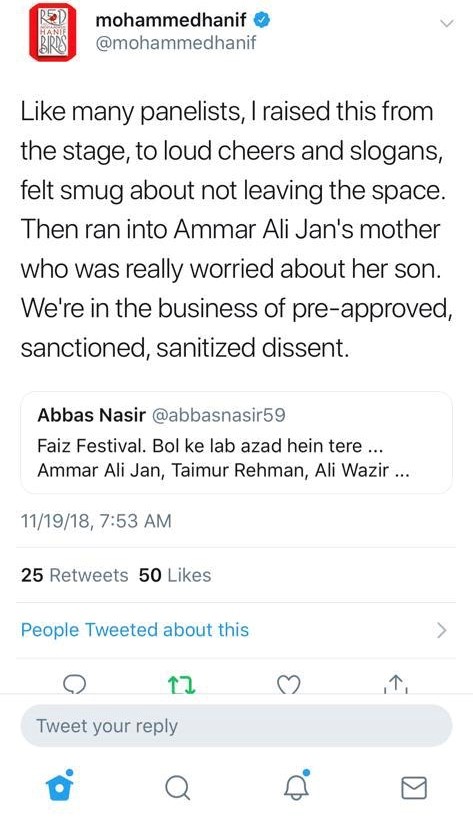
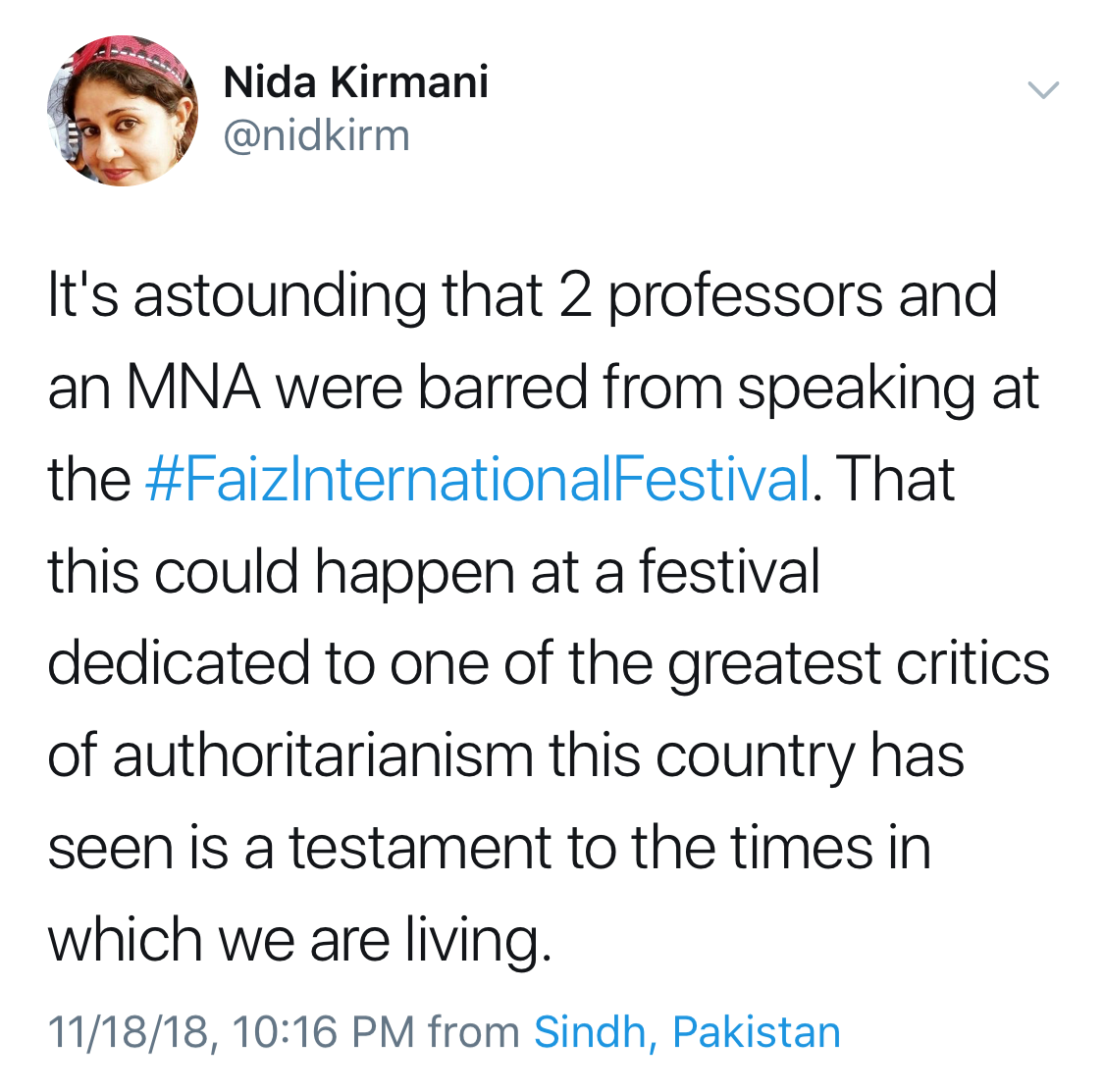
We can do better than Rashed Rahman’s ‘Dark times ahead’ blog on this incident: “I am feeling quite chuffed while writing these lines. I want to express my thanks to the powers that be for forcing the organisers of the Faiz Festival held in Alhamra Arts Council Lahore on November 16-18, 2018 to ban my and two others’ participation in discussion panels.The mind fairly boggles what catastrophe would have ensued if all three individuals were allowed to participate.”
“The issue is not of one or two individuals. It is far broader and encompasses by now both the mainstream and social media. The former has been emasculated by heavy leaning on acceptable and unacceptable content, shrinking of government advertising by 70 percent and private by 50 percent. This has led to one TV channel closing down and many others, big and small, teetering on the brink of collapse. Managements have embarked on ‘right-sizing’ (which actually means downsizing), with hundreds of journalists across the country being thrown out of their jobs and many more on their way out or threatened with redundancy. Mainstream media outlets are also complaining of the heavy but invisible hand of the censor. Working journalists are out in protest at Press Clubs throughout the country against limits on freedom of the media and the financial crunch that is losing, and is likely to lose more, jobs in the industry.’
“In our case, the education system having been virtually reduced to degree-awarding factories without heed to the intellectual development of the system’s charges, i.e. young minds, leaves them vulnerable to the saturated news and information cycle of the internet and social media without the intellectual tools or capacity to sift right from wrong, true from false. There are by now many instances of how social media lends itself to hate speech, instigation to violence and other such anti-social trends. The answer to this conundrum is lost in the din and pace of our times, which may rightly be dubbed ‘The Age of Distraction’.”
“Revisiting the lines with which this column began, bans and severe limitations on freedom of the media and expression lead to the conclusion that we now live under a controlled democracy that the deep state wishes to micro-manage in order to dominate the national narrative by means subtle where possible, worse where necessary. Dark times indeed.”
We end this post with these words by Dr Mohammad Taqi
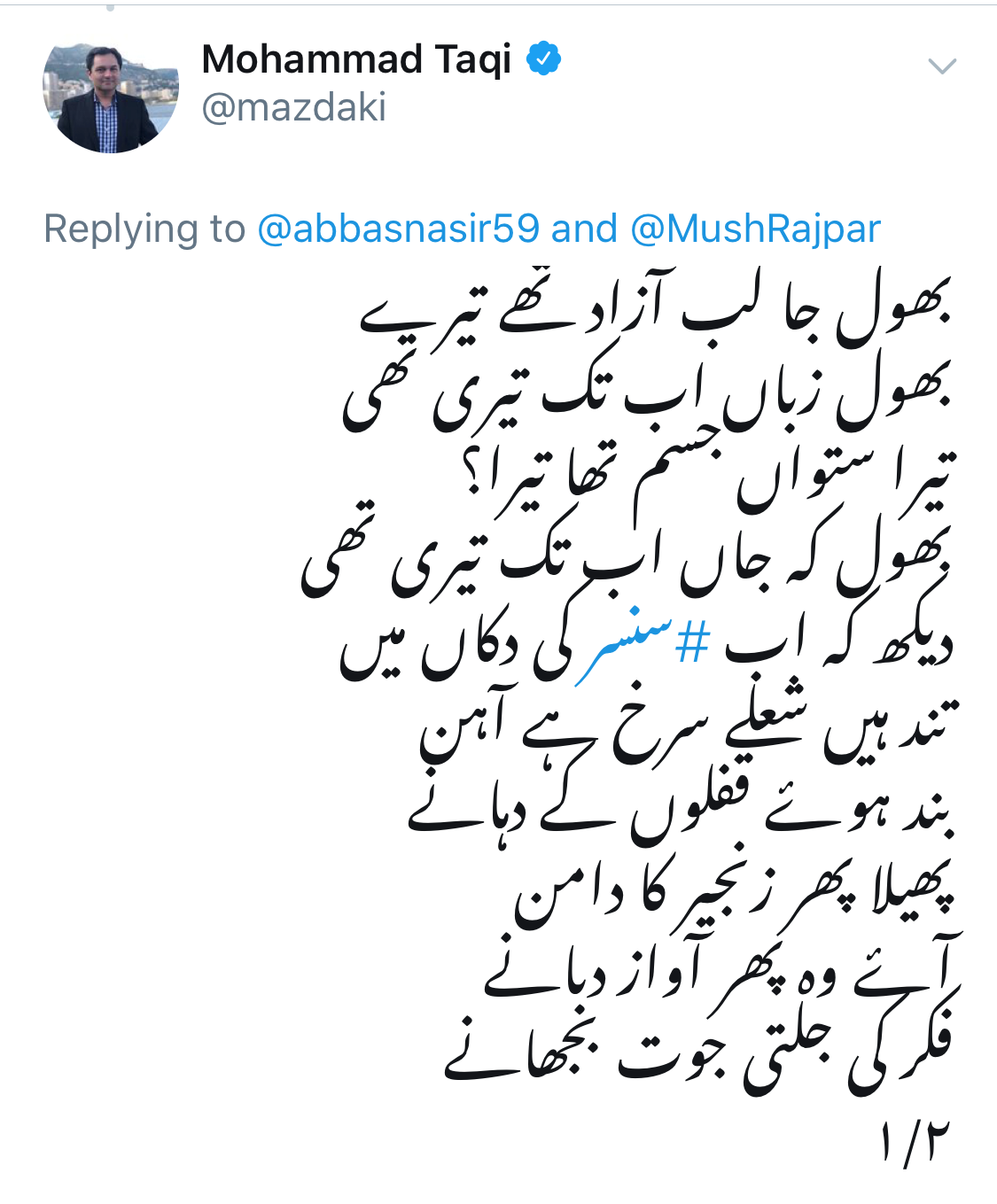
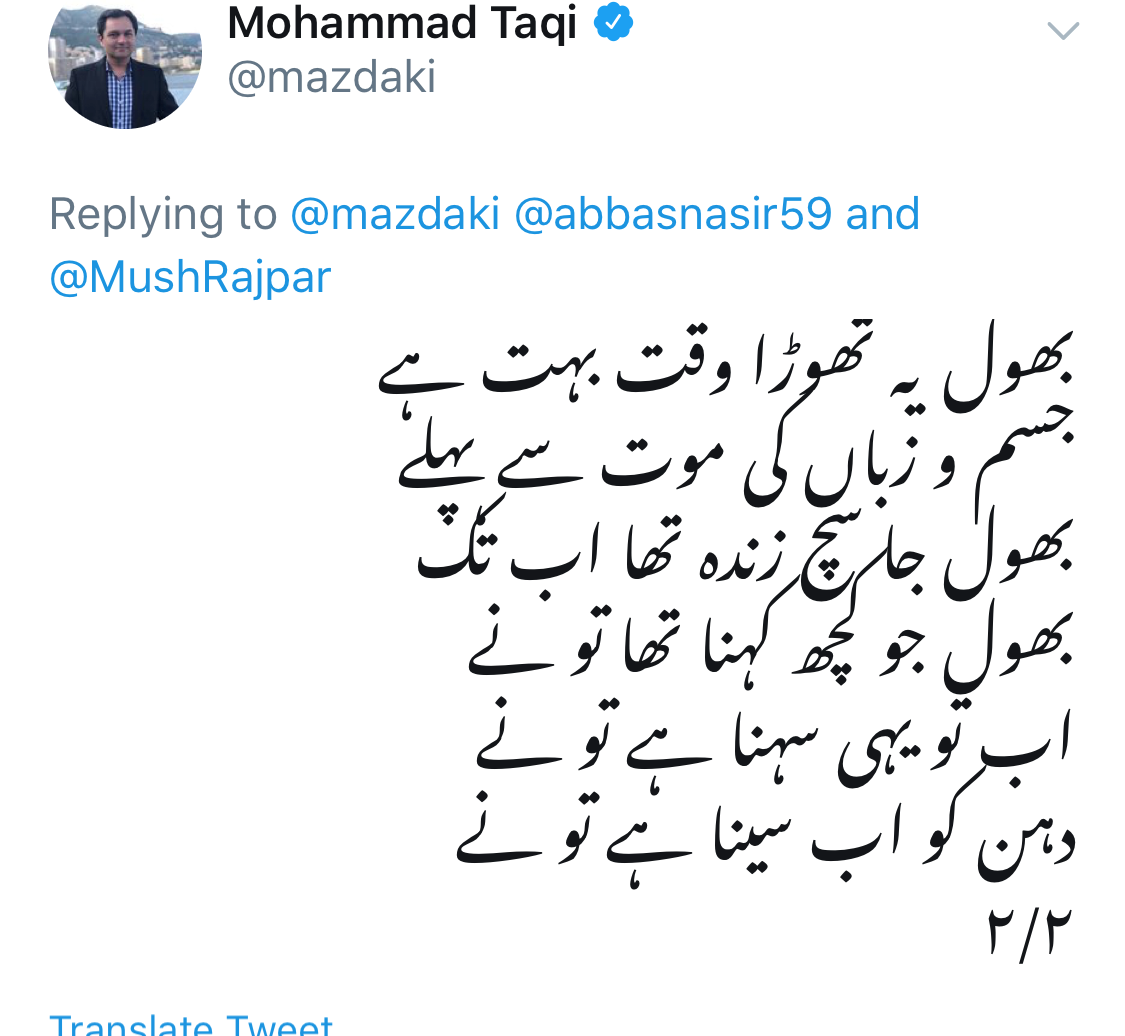
![]()





